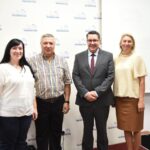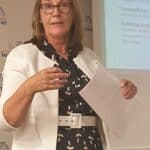This thesis explores the scale of bullying in Taiwanese schools and the impact of school anti-bullying policies. Critical realism is used in this policy-related research to argue against current empirical bullying research mainstream and how it may be possible to conduct scientific policy research in Taiwan. The thesis is divided into two parts, covering the literature review and methodology (four chapters in part one) and analysis of the case study in Taiwan (three chapters in part two). This research endeavours to link critical realism with empirical research to deepen our understanding of the school anti-bullying policy structure in Taiwan. The thesis begins with the exploration of the conceptualisation and development of bullying research in Chapter 2 whose main purpose is to capture the definition of bullying and the prevalence of school bullying in different countries and then illustrate the main research areas and the international trend of bullying research. Following Chapter 2, bullying-related theories and approaches to bullying research are highlighted in Chapter 3 and policy process theories and school anti-bullying policies are touched on in Chapter 4 in term of policy agenda setting, policy formulation and policy implementation consideration. A crucial role is played by Chapter 5 which focuses on the philosophical discussion of critical social research (ontology, epistemology and methodology) with reference to the appropriate use of practical methods and related ethical issues. This chapter sets out to explain how critical realism could function in this research to bridge the gap between the literature review and the case study research. In part two, three chapters discuss the formation of school anti-bullying policy in Taiwan. Chapter 6, which is an historical inquiry, illuminates the trajectory of school regulation policies with regard to the democratic transformation of a political system since 1945 in Taiwan. After the historical discussion, light is shed on empirical inquiry into school anti-bullying policy in Chapter 7, which analyses different debates over school anti-bullying policy and power struggles between four different policy stakeholders. Most importantly, Chapter 8 attempts to theorise the ‘generative mechanism’ behind the policy making process and the inferential logic of knowledge production is also considered at the end of this chapter. In addition, reflection on the generative mechanism and collective agency of community and professional groups in policy making are also involved. The concluding chapter reflects on the use of theories, methodology and the research findings in answer to the research questions and elaborates on the compatibility of critical realism, the critical qualitative case study and school anti-bullying policy research in Taiwan. To be reflexive this chapter finishes by looking at further research directions for policy making and practice between political governance, policy research and school practice.
Search Results for “Efficient 300-740 Flexible Learning Mode | 300-740 100% Free PDF Download 🥏 Copy URL 「 www.pdfvce.com 」 open and search for ➤ 300-740 ⮘ to download for free 🤬Valid 300-740 Mock Test”
Empathy is the ability to stand in another’s shoes, to approximate another’s experience, to feel what another feels. According to scientists, sociologists, psychologists, and Nobel Peace Laureates, empathy is crucial for the continuation and flourishing of humankind. When empathy is achieved, and an individual is able to perceive him/herself as the Other, the foundation for both transforming conflict and shifting of fundamental worldviews is possible. This research explores different aspects of conflict, primarily through the lens of bullying. Data was collected and analyzed from over 300 students ranging in age from 8-18 years. In addition, a variety of narrative forms from comic books and graphic novels to theatrical plays based upon ancient mythology to in-depth survey questions are investigated, examining moments where empathy may be experienced and understood by participants. These narratives created by student-participants are interpreted through a Narrative Phenomenology methodology, highlighting students’ perception of themselves as well as their lived-experience in relationship with others. These myriad story narratives reveal important information on ways social justice and human lights education, moral imagination, and adults as models of empathic behaviour might inspire youth to move past bullying and violence toward more compassionately motivated inclusive communities. Central to the research is the Triptych Narrative Method designed by the researcher that is utilized in a variety of settings and determined to be effective in aiding in the development of empathy. Through the identification of a Lacuna Epiphany Space, over which the act of dialogue may create a Lacuna Bridge. it is possible through an empathic-epiphany exchange for participants to become conscious of feeling with another. thereby bridging the often separate sense between Self and Other into a shared experience of Self as Other. This tool has far-reaching applications as well as the potential to assist in the global effort toward awakening humanity to their empathic abilities.
Recent historical developments in policy and practice have seen a gradual but significant shift towards less segregated provision for people with intellectual disabilities and the concepts of inclusion and citizenship now dominate current policy rhetoric. The recent UK government paper ‘Improving the Life Chances of Disabled People’ (Prime Minister’s Strategy Unit 2005), ambitiously proposes that ‘By 2025, disabled people in Britain should have full opportunities and choices to improve their quality of life and will be respected and included as equal members of society’ (pp.7). However, the conceptualisation and measurement of ‘inclusion’ in the intellectual disability literature has been rather narrow to date; focusing primarily on levels and determinants of participants in community-based activities and social networks. In order to gain a more comprehensive understanding of the inclusion/exclusion of people with intellectual disabilities, it may be useful to draw on models, theories and practices from the wider literature. This research sought to explore the experiences and perceptions of citizenship for a group of young men attending a College of Further Education. Eight young men with mild/moderate intellectual disabilities were interviewed using a semi-structured interview schedule. Interpretative Phenomenological Analysis (IPA) was used to analyse the data. Research findings indicated that inhibitors of community and civic participation included: neighbourhood deprivation, crime and antisocial behaviour; bullying and victimisation; and distrust of neighbours and public/political institutions. Facilitators of participation comprised: family modelling; social networks: financial and personal incentives; and political efficacy and trustworthiness. However, the young men were largely inhibited from engaging in social and civic participation and their lack of community connectedness was primarily associated with neighbourhood characteristics, as opposed to the impact of having an intellectual disability. Implications for future research, policy and practice are discussed.

Dublin City University has welcomed today’s announcement by the Irish Research Council that two researchers at the National Anti-Bullying Research and Resource Centre have been awarded grants in the New Foundations scheme.
Dr. Seline Keating, Assistant Professor in SPHE and Wellbeing in DCU’s Institute of Education and a Research Fellow at the National Anti-Bullying Centre, received a grant for ‘Exploring the Frixos Sexuality Programme and its relevance to the Irish RSE primary school context’.
Frixos is an award-winning sexuality education programme based on active and experiential learning methods suitable for primary school aged children in Ireland. Dr. Keating will exchange ideas with its creators and look at how it might positively impact the current Relationships and Sexuality Education (including sexuality-based bullying) review in Ireland and assist in the next phase of developing classroom materials and teacher training.
Derek Laffan, Research Assistant at the National Anti-Bullying Centre, was awarded funding for his project Tweets, Posts and Persecution: Online social networking among Palestinians and its influence on Palestinian identity and wellbeing.
Palestinians have embraced social media in recent years to express and promote their identity to the world as a resistance to the ongoing occupation. There has also been a strategic effort to demonise, disregard and delegitimize the Palestinian identity online which has led to Palestinians experiencing censorship and physical persecution related to their social media activities. This research study aims to identify what types of social media behaviours are related to persecution, and how social media has influenced Palestinian identity and wellbeing in recent years.
The New Foundations scheme provides support for research actions, the development of networks and consortia, conference and workshop development, and creative approaches to the communication of scientific concepts and/or complex societal challenges for a lay audience. This year, the scheme awarded grants under four strands: Engaging Civic Society; Knowledge Exchange for impact; STEAM; In partnership with the DFAR Networking & Collaboration Grants for prospective North-South Research Partnerships.
– Ends –
Background and aims: This study explores the types of attributions children make about school bullying situations and how these attributions may be related to subsequent behaviour and feelings. The relevant research background is explored – both from a bullying perspective and an attribution perspective. Psychological models that are thought relevant are discussed – particularly the learned helplessness and the Beck’s cognitive-behavioural model. The aims of the study were: to explore the kinds of attributions made about bullying by a non-clinical population; to explore the different types of attributions made by children within a framework of later attribution theories; to explore the relationship between type of attribution and type of solution offered; and to explore the themes linking different types of attributions in children’s stories. Results: The results of the content analysis suggested that children made a range of attributions which could be coded into characterological and behavioural attributions. There was some suggestion from correlational data that these were related to the type of solution offered by the participants. Qualitative analysis explored some of the connections between the types of attributions and concluded by describing a typical framework for a ‘story’ about the bullying incidents. Implications: Several implications are explored for both bullying and attribution research. Suggestions are given for school interventions – particularly the importance of working with the powerlessness of victims. For clinical interventions, some ideas are explored for working with children who have been bullied or bully – although future research would benefit from looking at attributions within a clinical population.
DCU Anti-Bullying Centre (ABC) was represented at a meeting of the TRIBES Project in Albania on 6th and 7th September 2022. The project is focused on migration and school bullying and involves 118 researchers from Europe, Australia and the USA.
The conference was chaired by DCU’s UNESCO Chair Prof. James O’Higgins Norman who reminded delegates of the importance of the project given the current context of migration in Europe and the war in Ukraine.
ABC Research Fellows Dr. Audrey Doyle and Dr. Niamh O’Brien presented a keynote paper on Participatory Action Research (PAR) with students tackling school bullying. Dr. Amalee Meehan, ABC Research Fellow, led a working group on Governmental Policies on Migration and Schools, and Dr. Angela Mazzone ABC Post-Doctoral Researcher led a working group on school climate.
The conference was opened by the Rector of the Mediterranean University of Albania, Prof. Adrian Civici. A key recommendation from the conference was that school curricula should be culturally competent in order to support the integration of migrant children in schools and wider society.
More information on www.tribesproject.com.
This thesis investigates the experiences of young people who identify as lesbian, gay, bisexual, transgender and who are questioning their sexuality (LGBTQ) on the Internet. Specifically, the project explores how LGBTQ young people use the Internet, how they communicate online, the impact that the Internet has on their life and how they stay safe online. Despite the Internet being an ever-growing aspect of people’s lives and the potential opportunities that it presents for marginalised groups such as LGBTQ young people, there have been a relatively small number of qualitative studies in the area. Methodology: As there has been limited research regarding LGBTQ young people’s use of the Internet, a systematic review of qualitative studies exploring the experiences and views of cyberbullying by children and adolescents in the general population was conducted using Framework Synthesis. Subsequently, an empirical study was completed which involved conducting a secondary analysis, using Framework Analysis methodology, of data collected from focus groups with LGBTQ young people regarding their Internet use. In total, five focus groups were held with forty-one LGBTQ young people recruited across four European countries. Results: A total of eighteen studies were included in the qualitative synthesis exploring children and adolescents’ cyberbullying experiences. Although there was some variation in the quality of the studies, there was clear support for four main themes: Online vs. Traditional Bullying Environment, Risk Factors, Victim’s Experience and Preventative Measures. These themes highlighted both the potential causative factors of cyberbullying as well as how the victim experiences different aspects of the incident such as their initial understanding of the event to the long-term impact of cyberbullying. A number of preventative measures were also suggested, including the need for adults to increase their understanding of technology and cyberbullying in order to enable them to be a viable source of help. Within the empirical study, four main themes emerged from the data: Digital World as Part of Daily Life, In Control of Their Online World, Seeking Connection and Navigating Risk. The latter three main themes also consisted of a number of subthemes. The results indicate that participants have embraced the Internet into their everyday lives and that the LGBTQ population reaps specific benefits as the Internet allows them to overcome or compensate for barriers faced within their offline lives. Participants also reported the need to navigate many risks online, however interestingly they appeared confident in doing so and discussed the variety of ways in which they achieve this. Discussion: The results of the qualitative synthesis provided tentative support for two different theoretical models of cyberbullying, indicating that both an individual process model and an ecological system model are mutually useful ways of understanding this phenomenon. Clinical implications spanned both individual and systemic measures that could be taken to reduce the likelihood of cyberbullying occurring. However, it is also clear that further research, in particular qualitative research, is required to continue to develop our understanding of this topic as a whole. The findings from the empirical project suggest that LGBTQ young people must balance the opportunities provided by the Internet whilst also managing the risks that it poses. The importance of retaining the empowerment for young people on the Internet was clear, especially for young LGBTQ people who may use the Internet as an alternative way of meeting their needs and engaging in developmental tasks such as sexual identity development. However, there is also a need to ensure that these young people are safe online and therefore interventions such as parental education and the development of age appropriate resources are required to promote both empowerment and safety for this population.
This thesis investigates bullying and negative behaviour among chefs working in commercial kitchens. The idea for this study arose due to evidence from the hospitality industry and amongst chefs in particular which suggested that negative behaviour and bullying were widely accepted practices. However, much of this evidence has been either anecdotal from media reporting or based on small scale studies.The industry has also complained about high labour turnover and the need for a trained workforce. Therefore, this study examines the behaviours to which chefs are exposed and if negative behaviours cause them to leave the industry.This thesis has used a questionnaire to measure responses from chefs who were either in training in catering colleges or working in the industry. Questionnaires were distributed to first year student chefs (n = 202), final year student chefs (n = 153) and working chefs (n = 304). Working chefs and final year student chefs were given questionnaires that included a behavioural method of measuring bullying, known as the NAQ-R, a self labelling method of measuring bullying and items about kitchen specific behaviours. Working chefs and final year student chefs were also asked about positive aspects of work and job satisfaction. First year student chefs were also given a personality instrument as well as being asked their opinions of kitchen specific behaviours. The findings suggest chefs’ exposure to regular bullying was in line with another major UK study (Hoel, 2002). However, occasional bullying was much higher. An examination of industry specific behaviours revealed that chefs tolerate a range of behaviours from verbal abuse on the one hand to physical and sexual abuse on the other. There were also positive aspects about the freedom of work and job satisfaction but this study was unable to find any evidence as to what made chefs stay in the industryThe study found that as student chefs become socialised into their role they were more likely to tolerate negative work behaviours and could identify reasons for their use although, this did not mean that they necessarily agreed with them. In fact, as the working chef sample was very different in ethnicity, gender and nationality from the student sample it could mean that due to negative behaviours on graduation students may not work as chefs.
Social media has changed how society communicates, transformed how individuals access the latest headline news and has altered many aspects of everyday life. It has, in turn changed the way in which individuals can target other members of society. In recent years, society has seen the likes of Facebook and Twitter used to distribute hate speech, accommodate revenge pornography and abuse others online. Consequently, the Government and the criminal justice system are being put under increasing pressure to tackle online abuse. Many of the current legal provisions contained in the law of England and Wales were enacted before the creation of social media. Yet these Acts are used to prosecute those who conduct abusive behaviour online. Issues are therefore arising with the adaptation of Acts of Parliament never intended to cover a digital age.
This thesis will critically examine several Acts of Parliament which have been used to control unlawful behaviour on social media sites, including, though not limited to, the Public Order Act 1986, the Malicious Communications Act 1988, and the Protection from Harassment Act 1997. It will be argued that the current use of these Acts breaches the fundamental principle of legality in the criminal law, before turning to examine freedom of speech and privacy online. Legality, at its very basic means the law needs to be accessible and clear to maintain the rule of law.
The final parts of this thesis will examine how other countries and institutions govern online behaviour. In the conclusive chapters, recommendations will be put forward as to how the legal system and society can better protect those who are abused online, including a draft social media Bill and a proposed universal code of conduct.
Dr. Darragh McCashin, Research Fellow at DCU’s Anti-Bullying Centre, was invited to speak at the 3rd UNESCO Global Forum on the Ethics of AI, held in Bangkok, Thailand. The session brought together global experts and policymakers to examine AI in education through two interconnected lenses: ethics as a domain of research, policy and practical concern, addressing the tensions, risks, and responsibilities emerging from AI use in educational settings; and ethics as a critical capability, probing what it means to create and use AI ethically, and how such capacities can be meaningfully embedded within education systems.
As a member of the UNESCO Chair on Bullying and Cyberbullying and Chair of the Observatory on Cyberbullying, Cyberhate and Online Harassment, Dr. McCashin’s address discussed key dilemmas surrounding rights-by-design and ethics-by-design approaches, with a core message: “just because we can, doesn’t mean that we should.” He highlighted insights from emerging mental health research, the importance of co-design with young people, and the (digital) rights of the child.



